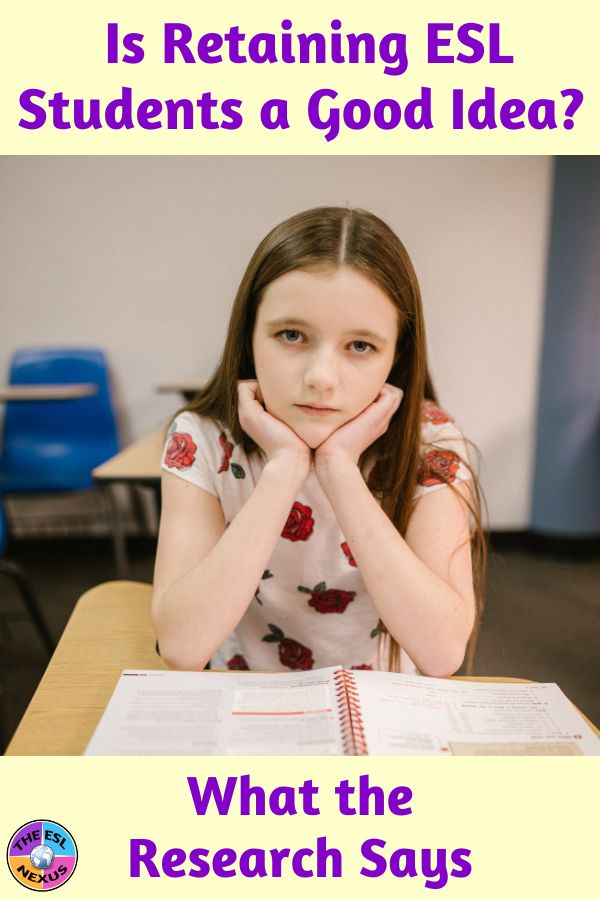This is the time of year when many teachers consider retaining ESL students. But retention of English Learners is problematic. Let’s look at why you might think keeping an ELL back for a year is a good idea, then see what the research says.
 |
| Source: The ESL Nexus |
Reasons for Retaining ESL Students
Is retention good for students? These are some of the reasons you may think keeping an EL student back for a year is a good idea:
* My English Language Learner is not doing well in my classroom.
* My ELL struggles with understanding the academic content I’m teaching.
* My Multilingual Learner has a hard time communicating their ideas clearly in English.
* My non-native English-speaking student finds it difficult to focus on classroom tasks for extended periods of time.
You may think retaining ESL students who fit that profile will benefit them. The rationale is that giving a student an extra year to learn the content subjects will help the ELL catch up to their peers. You may think that holding an English Learner back for a year will give them more time to improve their English language proficiency. You may think that retaining your Multilingual Learner will allow the student to become more mature and better able to do grade-appropriate classroom work.
Problems with Retaining ESL Students
Yes, you can retain an English Language Learner if they are not making adequate progress. But the problem is figuring out the reason why the ELL isn’t making progress: Is it because the student doesn’t understand the material or is it because the student doesn’t understand the language that is used to teach the material? Teachers have to modify their lessons so they are accessible to the English Learner student. If that isn’t happening, then the ELL shouldn’t be retained.
Giving an English Learner more time to learn English, by holding back the student for a year, in theory sounds good. But a student learning English as an additional language will continue to develop their language skills regardless of the grade they’re in (unless there is a severe learning disability, which is a different isue). So this reason doesn’t hold up when examined more closely. In fact, it is illegal to retain a student because they are not yet proficient in the English language. In this video from Colorín Colorado, Roger Rosenthal, the Executive Director of the Migrant Legal Action Program, explains why.
An inability to stay on task to complete academic tasks does not necessarily mean the ELL is unable to do the work. Very often, it means the student is overwhelmed by the language demands of the work and needs a break. Trying to process cognitive demands while simultaneously filtering them through a new language is exhausting. (Having attended high school in Sweden, I can personally attest to just how tiring it can be.) So although it may appear that an English Learner is not mature enough to do the work or is unable to handle grade-level work, frequently the reason for that behavior is due to language issues and not academic issues.
If you’re having a hard time figuring out why your English Language Learner isn’t doing well in your class, my Learning Disability or ESL Issue Guide for Educators of ELLs can help. It’s a questionnaire divided into 4 sections that ask about an ESL student’s academic experience and home environment. After answering all the questions, you’ll have info to make an informed decision about whether or not your student should be retained, should be referred for testing to see if there might be a learning disability, or if more ESL support should be provided.
 |
| Click HERE for more info about this resource; source: The ESL Nexus |
Research on Holding Students Back
But don’t take it just from me. Research proves that retaining a student is ineffective and in the long-term is actually detrimental.
The Education Trust wrote recently about the harmful effects of retaining students. They conclude that:
* Students who are retained do less well academically, socially, and emotionally over the long-term.
* English Language Learners and students who are Black or Latino are retained more often than students who are white or Asian, which raises questions of equitable treatment.
* Students who are retained need more support than just the extra year in order to achieve success.
Jamie L. Buckmaster wrote a 2019 doctoral dissertation called “Holding Back English Learners: The Impact of Early Elementary Grade Retention on Language Development.” The idea that keeping an ESL student back a year will help them develop their English language skills is thoroughly debunked and she concludes that: The findings indicate a clear message: there is no evidence that retention is beneficial to EL students. Grade retention was harmful to student language achievement. (P. 80)
It’s clear that retention of ELLs should only happen in rare cases. If you are thinking about retaining an English Language Learner, please think again! And please share this blog post with your colleagues if they have EL students they are considering holding back a year.




